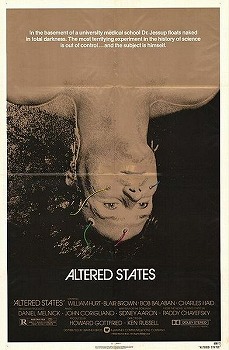I’d been meaning to watch Altered States for quite a few years. I suspect the reason (it’s been long enough that I can’t recall for sure) is that I knew it had a story line tied in with religion. The tale follows Edward Jessup, a psychopathologist, who is attempting to understand schizophrenia. He’s particularly taken by the religious nature of some schizophrenic delusions, and he uses sensory deprivation on himself to trigger something similar. A trip among tribal Mexicans leads him to a psychoactive substance that he decides to combine with sensory deprivation to enhance the effects. Along the way he explains to his girlfriend, and eventual wife, that his father was religious but died a horrible death. He therefore became irreligious but his altered states of consciousness are often full of images from Revelation.
While the Bible theme eventually gives way to biological regression to pre-Homo sapiens, one of Jessup’s experiences has him coming to his dying father again and dropping a Bible on him which turns into the veil of St. Veronica on his face, which he then rips off and throws, flaming, to the floor. Another instance of the Bible in horror, the film also uses crucifixes and hellish images to demonstrate the religious nature of these alternative states. Jessup’s goal is to regress to the original thought, to encounter, as he puts it “God.” This desire, combined with the potent Mexican drug, transforms him physically, and, in the end, emotionally. Instead of being dissociated from his wife (whom he is planning to divorce), he realizes that love is the only thing that can save him from the terror of his experiences.
This is some profound stuff. Paced like a movie from 1980, it has a quality not unlike 2001: A Space Odyssey. The message seems to be sound—the need for encountering the “divine” ends up convincing Jessup (that may autocorrect keeps changing to “Jesus”) that love is really what it’s all about. The transformation scenes, while not shown in the detail of An American Werewolf in London, are nevertheless convincing enough. It’s a rare movie that treats religion respectfully. Here Ivy-League scientists are motivated to understand it. In real life, alternative states of consciousness are quite real, if poorly understood. They’ve been part of religious practice from the beginning and are a far cry from sitting in the pew and singing anodyne hymns week after week. The more movies I see, the more it seems that a sequel to Holy Horror will be necessary some day.


2 thoughts on “Spiritual Alterations”